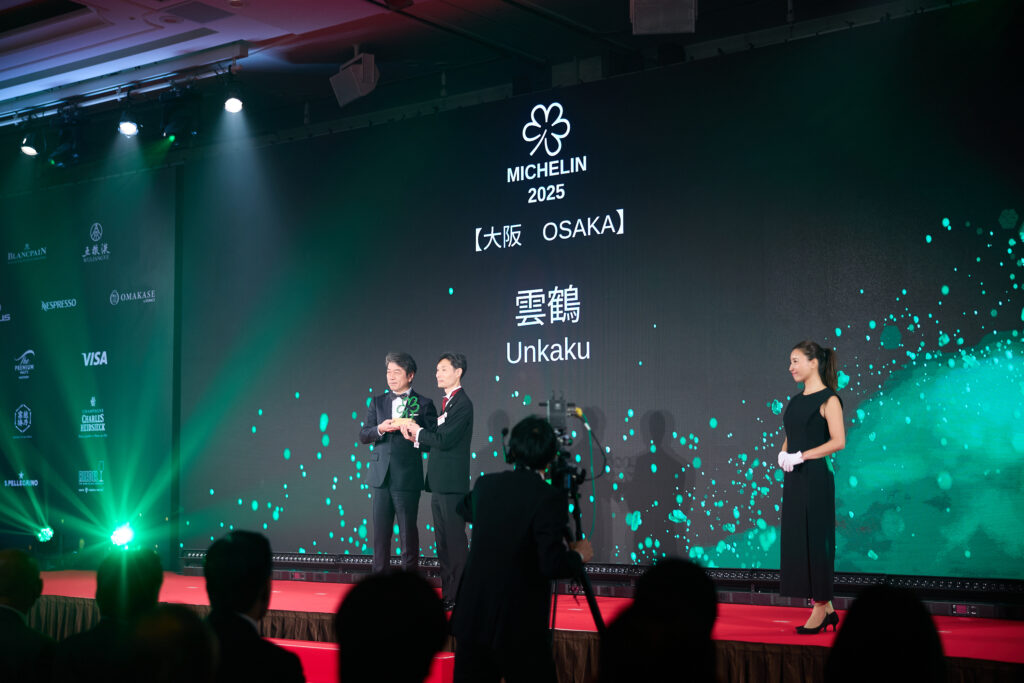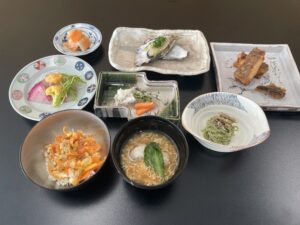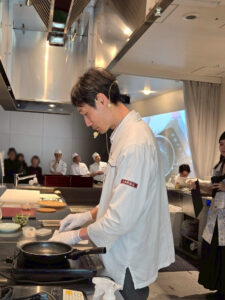
We are honored to be featured in the Michelin Guide Kyoto-Osaka 2025 with a Michelin Green Star.
昨年に続き、4年連続でミシュラングリーンスターの評価をいただきました。ミシュラングリーンスターとは、持続可能なガストロノミーに対し、積極的に活動しているレストランに光をあてるシンボルです。
大阪には「始末の料理」という言葉があります。「始末」には「後始末」と「始めから終わりまで」の二つの意味があり、始末の料理とは、食材のすべてに気を配り、無駄なく活かしきるという考え方です。たとえば鯛一尾を調理する際、頭や骨は出汁に、皮は焼いて香ばしい食感に、内臓は苦味やコクを活かした料理に仕上げるなど、それぞれの部位に合った最適な調理法を選ぶことで、一尾まるごと美味しくいただくことができます。これにより、廃棄を減らしながら、海の恵みを最大限に活かすことができるのです。
私たちは「エコのために料理する」のではなく、「美味しさを追求した結果、持続可能だった」という在り方を大切にしています。現代社会では、持続可能性が「後始末」の意味で語られることが多く、義務感からくる行動が時に反発や形骸化を生むこともあります。紙ストローのように、環境配慮の取り組みが一時的な流行で終わるのは残念なことです。
だからこそ私たちは、「美味しいから続けたくなる」料理を通じて、結果的に環境負荷を減らす取り組みを心がけています。形の悪い魚介や未利用魚の活用、魚の骨や皮まで使い切る調理は、単なる対策ではなく、料理人としての創意工夫の現れです。美味しさと持続可能性は両立できる——その姿勢を日々の厨房で実践しています。
雲鶴 料理長 島村雅晴
Following last year’s recognition, this marks our fourth consecutive year receiving the Green Star, which highlights restaurants that are committed to sustainable gastronomy and actively engage in environmentally conscious practices.
In Osaka, there is a traditional concept known as “shimatsu no ryōri”. The word shimatsu carries two meanings: “cleaning up after” and “paying attention from beginning to end.” This philosophy of cooking is about utilizing every part of an ingredient with care and respect, minimizing waste while maximizing flavor. For example, when preparing a whole sea bream, the head and bones are used for broth, the skin is crisped for texture, and the organs are transformed into rich, flavorful dishes. Each part is cooked using the most suitable method to bring out its unique qualities, ensuring nothing goes to waste.
We believe that sustainability should not be an obligation but a natural outcome of pursuing true deliciousness. In today’s world, sustainability is often approached as an afterthought or duty, which can lead to resistance or superficial efforts. Trends like paper straws may be well-intentioned, but without lasting impact, they risk becoming temporary fads.
That is why we strive to create food that people want to continue eating—not just because it’s good for the planet, but because it’s genuinely delicious. Making full use of less popular or imperfect seafood, utilizing bones and skins—these are not just eco-friendly actions but expressions of our culinary creativity and philosophy. We believe great taste and sustainability can go hand in hand, and we are committed to practicing this every day in our kitchen.
Masaharu Shimamura
Head Chef, Unkaku


